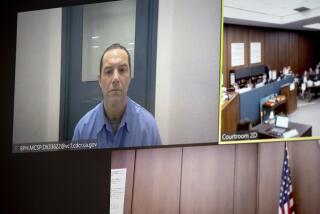Garcetti Has Few Options in Geronimo Pratt Case
- Share via
For prosecutors, it is the most difficult of decisions. What do you do when you honestly believe that someone is guilty as convicted 25 years ago but a court has granted him a new trial? That is the dilemma now facing Dist. Atty. Gil Garcetti as he decides the fate of Elmer “Geronimo” Pratt.
Pratt, the former Black Panther leader, was convicted in 1972 of the 1968 robbery-murder of Caroline Olsen on a tennis court in Santa Monica. The case against Pratt was based on three types of evidence: eyewitness testimony by the victim’s husband and by others who claimed to see Pratt or his car in the vicinity; ballistics tests linking a gun to which Pratt, together with others, had access; and the testimony of a fellow Black Panther, Julius “Julio” Butler.
While Pratt sought his freedom, court after court rejected his appeal of his life sentence. All of that changed last week. It took 25 years but, with the help of Garcetti and district attorney investigators, the defense finally came up with evidence to demonstrate that, indeed, Pratt did not receive a fair trial because the prosecution had failed to reveal that Butler, its key witness, was a police informant. Butler, a convicted felon, had received such favors as the permission to carry a gun; a district attorney’s investigator gave him $200 to buy the weapon. Police officers had asked for leniency in Butler’s own assault case. And Butler was not prosecuted for possession of a machine gun he had given to police. Needless to say, this information would have provided fine ammunition to the defense when it cross-examined Butler at trial. Yet none of it was revealed as legally required.
The prosecutors would also have had a much tougher time with their key eyewitness if they had played by the rules. At trial, it was never disclosed to the defense that the victim’s husband initially identified another person as the shooter. Had the defense been aware of this, that witness’ testimony could also have been challenged.
These crucial errors left Judge Everett C. Dickey with no choice but to grant Pratt’s motion for a new trial last week. Rules of disclosure are not just technicalities in our judicial system. As Garcetti recognized when he ordered the investigation reopened, discovery rules are the guarantee that we as a society are providing a fair trial and searching for the truth.
Given the errors in Pratt’s trial, not even the most seasoned prosecutor or most conservative judge could have confidence that the outcome was just.
Though today’s prosecutors have done nothing wrong, they nonetheless carry the burden of righting this wrong. Time has left them with very few options. Garcetti could retry the case, but if his evidence is the same as it was at the first trial, he would probably lose. Olsen’s husband, who testified as an eyewitness, is now dead. Another eyewitness is in a nursing home and is incompetent to testify. The gun evidence is inconclusive because many people had access to the murder weapon. The government’s key informant, Butler, has been publicly and officially branded a liar by the court. The prosecution won’t even have the benefit of defense mistakes, since it is highly unlikely that new defense counsel would seek to introduce questionable evidence.
Garcetti could appeal the order granting the new trial, but here too he would have an uphill battle. Dickey’s decision seems airtight on the law. Appealing would be nothing more than a stall and, in a case where a man has already spent 27 years in jail, this too might constitute an injustice.
Ultimately, the only realistic option may be for Garcetti to close the book. Pratt has served more time than most people convicted of a similar crime. Less than one-tenth of 1% of murderers have served 27 years in California’s prisons. Pratt seems the least likely of repeat offenders. I can think of many more dangerous offenders in line today to take his place in jail.
The Pratt case will always bother us because it demonstrates that our justice system is only as good as the people who operate it. The district attorney has the opportunity to show us the caliber of those who staff that office today. A zeal to win is fine, but sage, ethical judgment is even better. As frustrating and tragic as it may seem, it may simply be too late to give both Pratt and the people of California the fair trial they deserve.


